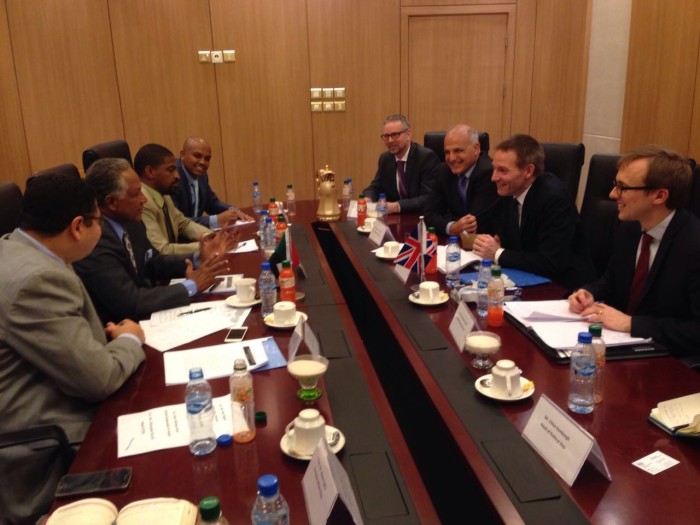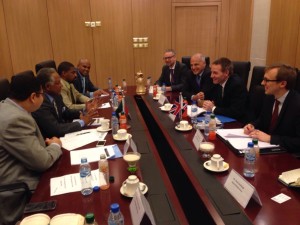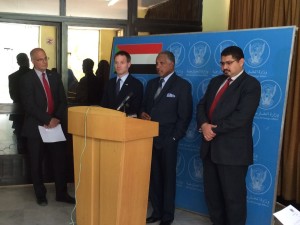7th April 2016 Khartoum
UK-Sudan strategic dialogue: “It’s good to talk”

For people in the UK, the catch phrase “It’s good to talk” conjures up memories of a rather persistent TV advertising campaign for telephone services, from one of our main telecom operators! It was one of those phrases that, during the 1990s, became synonymous with the simple act of picking up the phone and making a call.
Today, the phrase comes to my mind when I think back to last month’s visit to Khartoum by Neil Wigan, the Director for Africa at the Foreign and Commonwealth Office. His visit initiated a new “strategic dialogue” between the Governments of the United Kingdom and Sudan. Talks over two days, with different government ministries, ranged from UK-Sudan bilateral relations to the security situation in the region, from dealing with migration, to progress in ending Sudan’s own internal conflicts and advancing economic growth and human rights.

What do we mean by “strategic dialogue”? Putting the jargon aside, the concept is really quite simple. It’s about talking. Talking about what we have in common. Talking about where we differ. Talking about where we want to take our relationship and cooperation from here, and then putting that into practice.
It is, by definition, two-way. It is not one side imposing their agenda on the other, nor dominating the discussion. It is as much about listening and understanding the perspective of the other party, as it is about putting your own points across.
Perhaps this sounds obvious. But is it? How many issues and tensions in our day-to-day lives arise from misunderstandings due to poor or non existant communication, whether with colleague, friend or family member? Probably a large number! And if that’s the case in relationships between individuals, then how much more is it likely to be the case between governments, where multiple institutions and interlocutors are involved?!
The UK and Sudan have long maintained an exchange on all of these issues, and more. In many ways, the initiative of a “strategic dialogue” is simply putting a name to what we do already, confirming that we want to keep it up. It’s a way of bringing together all the different conversations we have, to look at the big picture. We intend to meet again for more formal talks before the end of the year.

But in formalising the mechanism, we are also sending a message. We are saying that Sudan matters to the UK (and hopefully that the UK matters to Sudan!). That we believe Sudan has an important role to play in facing today’s regional challenges. That we want to further develop our deep people to people ties, whether in cultural, economic and educational fields. That we care about the people of Sudan, and want to play our part to bring an end to conflict and humanitarian suffering and support economic development.
Our investment is already a testament to that commitment. We are the second largest humanitarian donor in Sudan, spending £50m a year on humanitarian and development aid. Our contribution to the UNAMID and UNISFA peacekeeping missions exceeded £60m in 2015. Our British Council presence is the third largest in sub-Saharan Africa, and reaches 4 million teachers and learners of English in Sudan each year. We have tripled the number of Chevening scholarships for Sudan, provided more than £1m training for journalists, and funded three successful series of the hit TV show Mashoury. I could go on.
The formal talks last week focused on cementing this commitment and developing it for the future. They also provided an important forum for us to exchange frank and honest views on the issues where we disagree. We know that talking alone will not solve some of the most difficult challenges in Sudan. In particular, to resolve the continued conflicts, it is incumbent on the different sides to take action, and to do so as a matter of urgency to bring the needless human suffering to an end.
We won’t achieve these objectives by talking to government alone. We need to be engaging extensively with a range of other actors in Sudan, including civil society, academia, media, and opposition. They have an incredibly important role to play, and Neil also talked with representatives of all these groups during his visit.
Thinking back to the old TV adverts, I hope that the initiative of this new dialogue will make our engagement in Sudan as simple as picking up the phone, as we seek to expand and deepen our dialogue with all actors for the benefit of both countries.
I think you missed engaging important partners, namely private sector and the academia in this strategic dialouge… in talking about development or poverty reduction we need to hear those voices …best route to alleviate poverty is to create productive jobs. Over the last 15 years the private sector created by far more jobs than the government…we need an engagement with British academia, CDC & british business community
In walking the talk we should rest on displaying records of achievements that are attributed to intellectual powers of those who were pioneers to lay the foundation of Sudan political, social, economical and cultural strengths. The fame of those veterans was comprehensive knowledge they had and which we need to study in order to gear progress for future prospects. It is true that not every bit is progress-able, but comprehensive knowledge makes the distinction to avoid the inconsistent or hazard renewals and changes, which might have ruined indispensable establishments e.g. to quote: disqualifying syllabuses and methods to teach English language in Sudan; as elsewhere follies substituted quantitative producing variety of cotton seeds to erase the qualitative long stable cotton variety of better market value. Awareness by knowledge, experience and expertise through utilization of modern communication techniques is capable of liberating brains from the crises of emotional influence; and consequently makes the individual prepared to harmonize and symphonize with himself before reconciling with others. As such vision intermingles over acquired concepts, the cream eternize through modernity, renewal and change.
Thank you Chloe for this blog and for sharing your efforts with the public. It would be good to learn a bit more about the issues where the UK and the GoS don’t see to eye to eye and possibly the position of each on these matters.
Following the initative of Lina Haggar and her recent book “Artists in Adversity”celebrating the younger generation of Sudanese Artists, why not promote a big expo of Sudanese artists to be held in UK? Griselda
A very constructive and frank article.
On 15 March, I attended a “Global Strategy Forum “book launch .The collection of essays published by the British Council were about “Dialogue”.In his contribution, Alan Goulty,the former Ambassador to the Sudan argued that one can’t argue with the Sudan without speaking to the president.
This is the shadow over the strategic consultations;despite the sincere goodwill of participants.